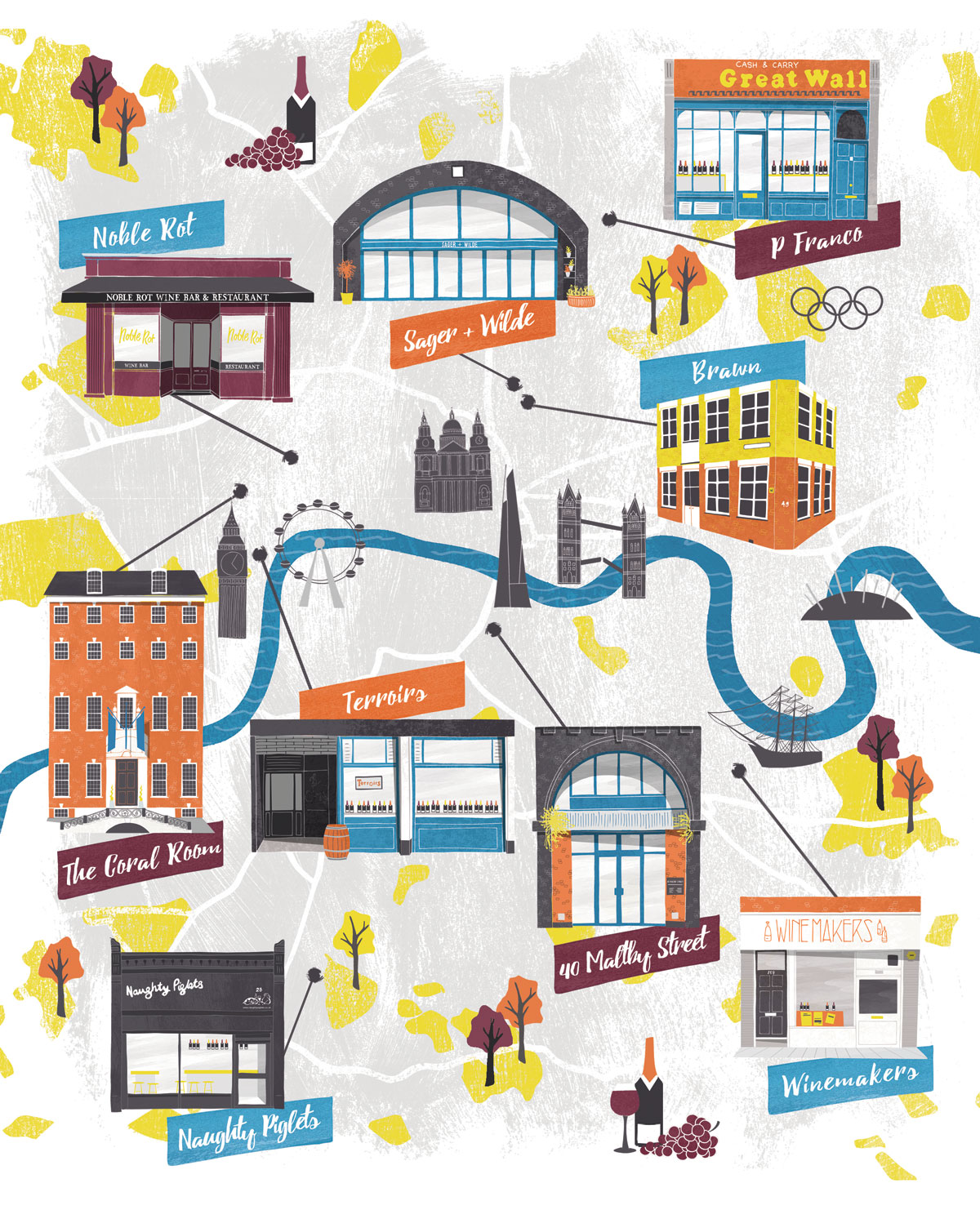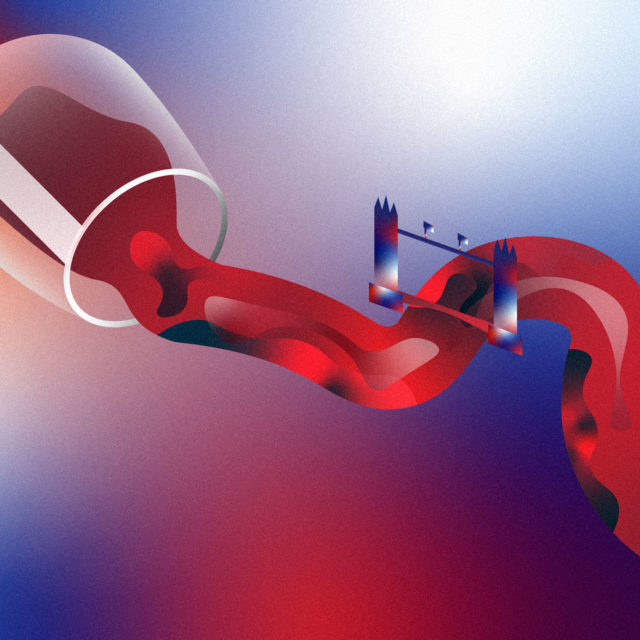Early on a Friday evening, London’s Deptford High Street is teeming with pedestrians. One suit-clad gentleman stops in the doorway of Winemakers Deptford, a low-key wine bar with soft green walls and a black and white floor. He peers in longingly.
“The thing is, if I go in, I’ll never leave,” he says to the bartender and the night’s first customer, a woman sipping Italian natural wine. “Maybe tomorrow,” he chuckles. He’s a regular there, and one of many locals who are glad the establishment has returned to their pocket of southeast London.
Originally a full-fledged restaurant, Winemakers Deptford reopened as a wine bar in 2018. Its new iteration suits the denizens of Deptford, a vibrant, multicultural London neighborhood with a rich nautical past. They drink Chenin Blanc from the Loire Valley’s Domaine Lise et Bertrand Jousset, and eat buckwheat-linseed pancakes with harissa and green pepper off a weekly-changing chalkboard menu.
London’s drinking culture will forever be synonymous with bustling pubs and posh hotel bars, but, in recent years, the city has unleashed a colorful, indie wine scene. Experimental, unpretentious spots like Winemakers Deptford complement London’s evolving restaurants, and contrast with long-standing tourist hubs like Gordon’s, the 1890 wine bar close to Charing Cross station and rumored to be the city’s oldest.
John Baum, an importer of organic and biodynamic wines, owns Winemakers Deptford and its predecessor, Winemakers Club, a wine shop and bar that opened in 2014 in Farringdon. He credits London’s proliferation of new-wave wine bars to Terroirs, which debuted in Covent Garden in 2009, and Sager + Wilde, a wine bar that started as a pop-up and now has a permanent space on Hackney Road.
In the early 2000s, “there was a generational gap, and people were looking for a more diverse quality of wine in London,” Baum explains. “There was a focus on things that were not otherwise available. Sager + Wilde offered a list of wines that were exciting and a great value. Others realized that this approach made sense because there was a lack of places where we could drink orange wine and eat simple food, so the concept blossomed from there, with a lot of inspiration from Paris and Tokyo.”
Sager + Wilde paved the way for the cozy Remedy Wine Bar Shop & Kitchen in Fitzrovia, and the Experimental Group’s Parisian import, Compagnie des Vins Surnaturels Seven Dials, in Neal’s Yard. A slew of neighborhood wine bars sprouted in the coming years, including Unwined in Tooting, Furanxo in Dalston, and, recently, Diogenes the Dog in Elephant & Castle. All specialize in small-production, quirky, organic, and hard-to-find wines. They appeal to Londoners who want affordable drinks in a relaxed setting, all without schlepping too far from home.
When Margaux Aubry and business partner Joe Sharratt opened Naughty Piglets in Brixton in 2015, there were just 30 wines on the list, 15 white and 15 red. It’s now grown to 200 bottles. In 2017, the duo opened the Other Naughty Piglet inside the Other Palace theater in Victoria.
“The focus has been on food for so long — where does it come from, how sustainable and organic is it? More and more bars and restaurants within the last decade began working with small wine producers around the world who cared, starting in the vineyards and following into the cellar,” Aubry says. “People who work in the wine world are educating customers, conveying a more organic, natural way, and consumers are definitely more ready now than they were a few years back.”
Phil Bracey also noticed this cultural shift. That’s why he moved from his native Australia in 2015 to run the then year-old P. Franco in Clapton. This petite wine shop and bar, from the same team as retailer Noble Fine Liquor, telegraphs the charm of Parisian caves à manger. Night after night, an array of guest chefs turn out dishes to accompany the natural and low-intervention bottles casually pulled from the shelves. “One of the great things about our wines is that they have a lot more fun surrounding them. We relish the chance to show you a wine you might not know. There isn’t a snooty nature,” Bracey says.
The accessible vibes resonate with P. Franco’s largely East London clientele. “It was a huge risk being so out of the way, but the overhead was a lot lower,” Bracey says. “Our guests can sit there with a wine and not worry about it being too expensive.”
Baum agrees. “If you really want to go and try something new, it’s difficult to do in a fine-dining restaurant because margins are so high,” he says.
Just a short walk up Hackney Road from Sager + Wilde lies The Laughing Heart, opened in 2016 by opera singer-turned-sommelier Charlie Mellor, who also hails from Australia and has worked at Elliot’s, P. Franco, Brawn, and Primeur in London. Mellor believes his East London audience is drawn to stories about captivating producers, especially in up-and-coming regions like Sicily and Central Europe. “I didn’t want to open the place with a little, elegant list. I wanted a fit but fat one with lots of interesting wines,” he says.
The industrial dining room, where cutlery is tucked away in built-in table drawers, has a gently priced wildcard tasting menu of dishes merging local ingredients and global influences. It’s located above a wine shop for guests to wander through after eating their Sichuan crème brûlée.
The P. Franco crew opened Bright in Hackney in 2018. It’s a proper restaurant, serving radicchio with preserved cherry, and tagliolini with porcini butter and black truffle, alongside wines from conscientious producers like Céline Gormally of Jura’s Les Dolamies. This formula also works at the group’s most recent venture, Peg, located less than 10 minutes from P. Franco in the former spillover bar Legs. Peg offers natural wine, yakitori skewers, and raw shrimp dressed with blood orange and sancho leaf.
“People were worried we’d cannibalize ourselves,” Bracey says, “but the vibes and food are different. We’re putting the wine into three different contexts.”
There’s plenty of exciting wine from ambitious, small producers to go around, Mellor says. “Natural wine is a fast-growing market and it’s wonderful. It’s provided really hardworking farmers with necessary relief and the validation that what they’re doing is appreciated.”

Where to Taste London’s New Wine Scene
40 Maltby
Importer Gergovie Wines operates this bar in its Bermondsey warehouse where guests sip La Sorga “Ah Ramon,” a Languedoc-Roussillon red blend, alongside small plates.
Brawn
The co-owner of Terroirs opened this airy Bethnal Green restaurant in 2010. Pair lunches of ‘nduja crostini and ricotta ravioli with Cantina Giardino Fiano from Campania.
The Coral Room
At the Bloomsbury Hotel’s Art Deco restaurant, Master of Wine Anne McHale rotates six sparkling wines from small English vineyards on the menu.
Naughty Piglets
The 200-strong list at this Brixton wine bar includes minimal intervention wines from Italy’s Cantina Furlani or Jura’s Emmanuel Houillon.
Noble Rot Restaurant & Wine Bar
Sample goat cheese tarts, Hereford beef carpaccio, and Riesling from Heymann-Löwenstein in this restaurant from Noble Rot magazine in an elegant Bloomsbury townhouse.
P. Franco
At this welcoming Clapton spot, guests pair low-intervention bottles with dishes created by a rotating cast of guest chefs.
Sager + Wilde
Local wine pros credit this pop-up-turned-wine bar on Hackney Road among the earliest exemplars of London’s new wave.
Terroirs
An innovator in London’s indie wine scene, Terroirs opened in Covent Garden in 2009 and specializes in natural and organic wines.
Winemakers Deptford
This wine bar from the team behind Winemakers Club serves up low-key vibes, a chalkboard menu, and small-production and low-intervention wines.
